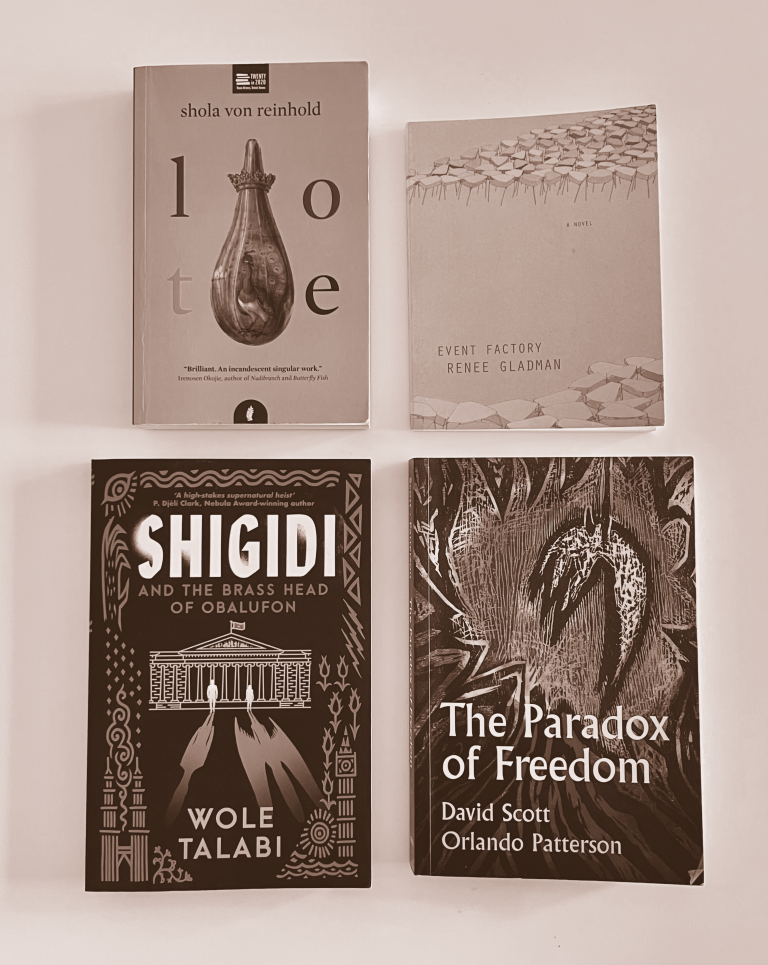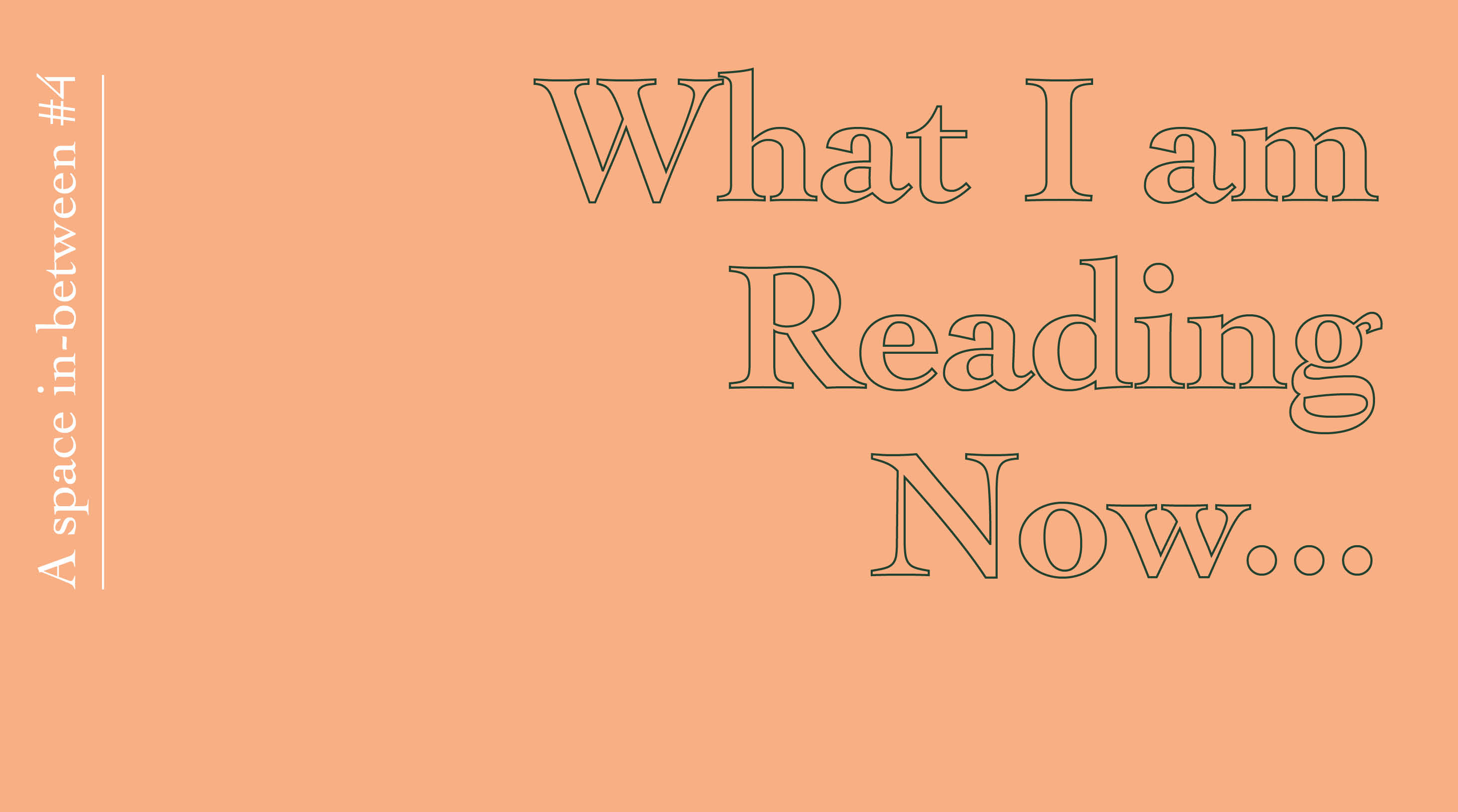What I am Reading Now…
Kodwo Eshun
October 2023
1.
LOTE
Shola von Reinhold
Jacaranda Books, 2020
Allow me to list a few of the ways in which everything I love in this novel is inseparable from the formal artifice of its historical artifactuality: Mathilda’s inordinate efforts to locate and acquire a copy of Helena Morgan’s Black Modernisms, passages of which appear throughout LOTE; the art historical detective work undertaken by Morgan to reconstruct the ‘black decadent queer’ milieu around the suppressed details of the lives and works of the Slade trained artist Hermia Druitt; von Reinhold’s recourse to a recondite vocabulary of the ‘finial’, ‘effloresced’, ‘rubicund,’ ‘faceted’ or ‘mantilla’; their attentiveness to the self-serious vocabulary of ‘markations’ and ‘convexity’ adopted by the self-regarding white Garreauxvians at the Dun Residency dedicated to the project of Thought Art engendered by the cult of personality around the white American theorist John Garreaux, the exquisite figure of Erskine Lily who personifies ‘artifice in motion,’ Mathilda’s discovery that the entire structure of Garreauxvian Thought Art is built upon repressing and entombing the historical memory of the alchemical rites of transformation to which Druitt had dedicated her life. LOTE is exorbitance in excelsis: exquisite, excessive, excentred, elegant, English, erudite, egressive.
2.
Shigidi and the Brass Head of Obalufon
Wole Talabi
Gollancz, 2023
There is a sheer pleasure in reading about Shigidi, a minor nightmare god, and Nneoma, a succubus, lying in their new bodies on a beach in Perhentian Kecil Island, Malaysia, as they find themselves instructed by Olorun to break into the British Museum at 03.58am in order to steal the brass head of Obalufon from ‘a raised glass cage of its own’, avoiding the security system of the Royal British Spirit Bureau by exiting through the spirit-side of London so as to pay off their debt to the Orisha Spirit Company so that Olorun can remove Shango from his position as CEO. This is to say that a heist which entails treating Shigidi and Nneoma as precarious orishas on the outside of the Yoruba pantheon rendered as a corporation exemplifies the genre of godpunk. When the ancient deities of the Yoruba pantheon are subject to the contemporary imperatives of the urban thriller or the crime novel or sci-fi then pan-Yoruba theosis gets processed through a drama of detranscendentalisation at a tempo that is nothing less than thrilling. To read Shigidi and the Brass Head of Obalufon or David Mogo Godhunter (which I haven’t, not yet) or The Invisibles, (which I still haven’t) or Jared Hickman’s Black Prometheus: Race and Radicalism in the Age of Slavery or Anna Della Subin’s Accidental Gods: On Men Unwittingly Turned Divine or the anime Yasuke or Alexsei German’s film Hard to Be a God or Percy Jackson and the Lightning Thief is to gain a sense of how to reverse-engineer a narrative vehicle of immanentization that moves at high speed within the precincts of everyday sacredness.
3.
Event Factory
Renee Gladman
Dorothy, 2010
I am finally embarking upon the first of artist Renee Gladman’s four Ravicka novels. To read Event Factory is to find yourself losing your bearings. A subtle dislocation of expectation operates within and between and across each sentence. The Ravickians that inhabit the interior spaces of the city-state of Ravicka find it difficult to gain traction on a shared reality that evades transcription. What ensues is a kind of referential dyslexia in which bearing, conduct, gestures, gait, greetings, conversations, names, entrances, exits, staircases, corridors, apartments, streets slide or sidle away from each other. It is as if whatever it is that is presumed to hold each entity or each object in relation to every other entity never quite worked in the way it should do in Ravicka. It is not that things are falling apart; its more that whatever it is that held them together has become a question that nobody has the language to elucidate or reply. As you read, what keeps coming to mind, unbidden, are Gladman’s characterisations of her elusive artworks: Writing drawing. Drawn writing. Prose architectures.
4.
The Paradox of Freedom: A Biographical Dialogue
David Scott and Orlando Patterson
Polity, 2023
The Paradox of Freedom: A Biographical Dialogue extends the fascinating biographical interview undertaken by David Scott – whose books Refashioning Futures: Criticism after Postcoloniality, Conscripts of Modernity: The Tragedy of Colonial Enlightenment and Omens of Adversity: Tragedy, Time, Memory, Justice are essential texts for thinking through the historical futures of decolonisation from the perspective of the present – with the historical sociologist and novelist Orlando Patterson – whose Slavery and Social Death provides Afropessimism with its foundational vocabulary of natal alienation and generalised dishonour – for the journal Small Axe: A Caribbean Journal of Criticism, in 2013. Scott carefully, patiently and persistently probes, inquires and invites Patterson to narrate his life, moving from his encounter with Rastafarians in Jamaica in 1959 that informed his first novel The Children of Sisyphus to his influence upon the writing of Edward Kamau Brathwaite, who does not come off well, to the critical arguments that informed the writing of his third novel Die the Long Day and his controversial comparative epics Slavery and Social Death: A Comparative Study and Freedom in the Making of Western Culture Volume I which argue for what Scott calls the ‘densely paradoxical relationship between freedom and slavery’ at the centre of the making of Western civilisation.
Kodwo Eshun is co-founder of The Otolith Group. He lectures at Centre for Research Architecture, Department of Visual Cultures, Goldsmiths and Visual Arts Department, Haut Ecole d’Art et Design, Geneve.
Reading
LOTE, Shola von Reinhold (Jacaranda Books, 2020)
Shigidi and the Brass Head of Obalufon, Wole Talabi (Gollancz, 2023)
Event Factory, Renee Gladman (Dorothy, 2010)
The Paradox of Freedom: A Biographical Dialogue, David Scott and Orlando Patterson (Polity, 2023)

Please note the views published in What I am Reading Now… are personal reflections of the contributors.
These may not necessarily represent the views of the University of Dundee.
———
Previous Issue: Akwugo Emejulu, September 2023
Next Issue: Anjalika Sagar, November 2023
